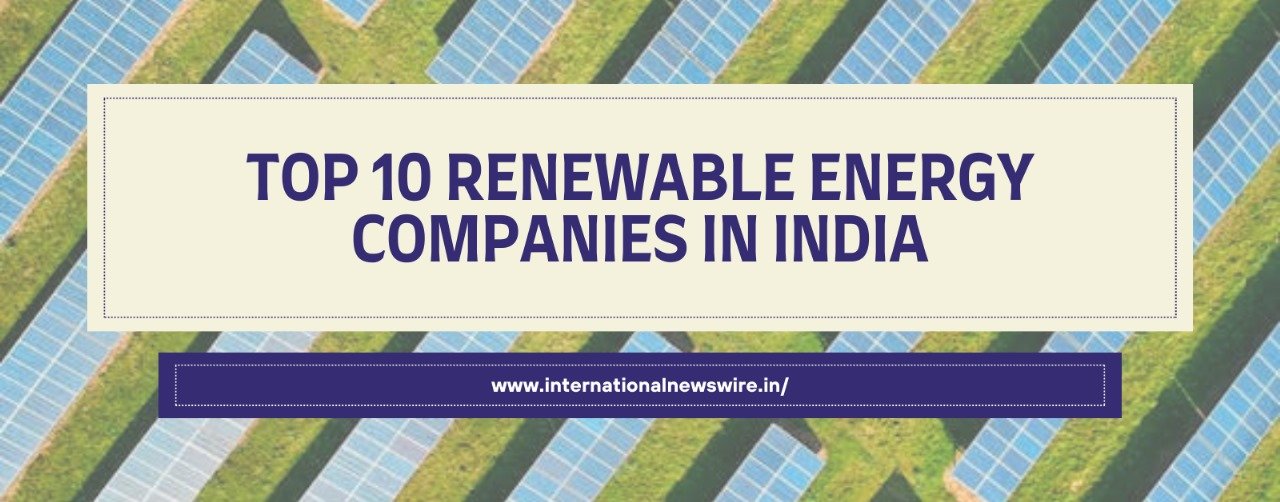Top 10 Renewable Energy Companies in India are at the forefront of revolutionizing how societies generate and consume electricity. Solar power, derived from harnessing sunlight through photovoltaic cells, has become increasingly efficient and cost-effective, leading to widespread adoption in both residential and utility-scale applications. Similarly, wind energy, generated by turbines that convert wind into electricity, has grown rapidly across diverse geographical regions with favorable wind conditions. These advancements not only reduce greenhouse gas emissions but also enhance energy security by diversifying energy sources and reducing reliance on imported fossil fuels.
Hydropower remains a stalwart in the renewable energy sector, utilizing flowing or falling water to generate electricity through turbines. It provides reliable baseload power and plays a crucial role in meeting electricity demand, particularly in regions with abundant water resources. Biomass and geothermal energy, derived from organic materials and heat from the Earth’s crust, respectively, offer versatile alternatives that contribute to a balanced energy portfolio.
The integration of renewable energy into existing power grids presents challenges such as variability and intermittency, requiring innovations in energy storage and grid management. Nevertheless, ongoing research and development in battery storage, smart grid technologies, and predictive analytics are enhancing grid stability and maximizing the potential of renewable energy sources. As governments, industries, and communities worldwide embrace renewable energy solutions, the sector continues to evolve, driving sustainable development and paving the way towards a cleaner, more resilient energy future.
Table of Contents
1. ReNew Power

ReNew Power, founded in 2011 by Sumant Sinha, has quickly become one of India’s largest renewable energy companies, specializing in wind and solar power generation. The company operates numerous projects nationwide, playing a pivotal role in enhancing India’s renewable energy capacity. ReNew Power’s commitment to sustainable development practices and carbon emission reduction underscores its leadership in the renewable energy sector. With a focus on innovation and community engagement, ReNew Power continues to drive the adoption of clean energy solutions in India.
| Details | Description |
|---|---|
| Founded | 2011 |
| Headquarters | Gurugram, Haryana |
| Founder | Sumant Sinha |
| Types of Energy | Wind, Solar |
| Capacity | Over 5 GW |
| Projects | Pan-India |
| Key Focus | Renewable Energy Generation |
| Sustainability | Emphasis on Carbon Emission Reduction |
Also Read : Top 10 Event Companies in India
2. Adani Green Energy

Adani Green Energy, established in 2015 and part of the Adani Group, is a prominent player in India’s renewable energy sector, focusing on solar and wind power projects. The company has made substantial investments in renewable energy infrastructure and is committed to expanding its capacity in the future. Adani Green Energy is actively involved in utility-scale and distributed solar power generation across multiple states in India, contributing significantly to the nation’s renewable energy goals.
| Details | Description |
|---|---|
| Founded | 2015 |
| Headquarters | Ahmedabad, Gujarat |
| Parent Company | Adani Group |
| Types of Energy | Solar, Wind |
| Capacity | Over 15 GW |
| Projects | Pan-India |
| Investments | Large-scale Renewable Energy Projects |
| Expansion | Focus on Increasing Solar Capacity |
Also Read : Top 10 Women in Tech Startups in India
3. Tata Power Renewable Energy Ltd. (TPREL)

Tata Power Renewable Energy Ltd. (TPREL), a subsidiary of Tata Power, specializes in renewable energy generation through solar and wind power projects across India. With a substantial portfolio of renewable energy assets, TPREL is committed to expanding its capacity through organic growth and strategic acquisitions. This aligns with Tata Group’s broader commitment to sustainability and advancing clean energy solutions to meet India’s growing energy needs. TPREL also focuses on leveraging innovative technologies to optimize energy efficiency and environmental impact.
| Details | Description |
|---|---|
| Founded | – |
| Headquarters | Mumbai, Maharashtra |
| Parent Company | Tata Power |
| Types of Energy | Solar, Wind |
| Capacity | Over 4 GW |
| Projects | Pan-India |
| Growth Strategy | Organic Growth and Acquisitions |
| Sustainability | Integration with Tata Group’s Values |
Also Read : Top 10 Food Waste Startups in India
4. Suzlon Energy Ltd.

Suzlon Energy Ltd., established in 1995, is a key player in India’s wind energy sector, renowned for its comprehensive offerings in manufacturing, installation, and maintenance of wind turbines. The company has played a pivotal role in developing numerous wind power projects across India and maintains a diverse portfolio in the renewable energy sector. Suzlon continues to lead through innovation, contributing significantly to the advancement of renewable energy technology.
| Details | Description |
|---|---|
| Founded | 1995 |
| Headquarters | Pune, Maharashtra |
| Types of Energy | Wind |
| Capacity | Over 18 GW |
| Projects | Pan-India |
| Expertise | Integrated Wind Energy Solutions |
| Innovation | Focus on Renewable Energy Technology |
Also Read : Top 10 Digital Transformation Startups in India
5. Hero Future Energies

Hero Future Energies, a part of the Hero Group, focuses on solar and wind power generation and was established in 2012. The company has swiftly expanded its renewable energy portfolio across multiple states in India. Known for its strong commitment to sustainability, Hero Future Energies aims to make substantial contributions to India’s renewable energy targets through its various projects and initiatives. With a strategic emphasis on technological innovation and community engagement, Hero Future Energies continues to drive the growth of clean energy solutions in the country.
| Details | Description |
|---|---|
| Founded | 2012 |
| Headquarters | New Delhi, India |
| Parent Company | Hero Group |
| Types of Energy | Solar, Wind |
| Capacity | Over 1.3 GW |
| Projects | Pan-India |
| Sustainability | Commitment to Renewable Energy Goals |
| Expansion | Growth in Solar and Wind Capacities |
Also Read : Top 10 Platforms in India to get Remote Work
6. Greenko Energy Holdings

Greenko Energy Holdings, established in 2006 and headquartered in Hyderabad, India, is a leading renewable energy company focusing on clean energy solutions through hydro, wind, and solar power projects. The company has built a robust portfolio of renewable energy assets across multiple states in India and is recognized for its integrated approach to renewable energy development, making substantial contributions to India’s renewable energy capacity and sustainability objectives. With a commitment to innovation and environmental stewardship, Greenko continues to play a pivotal role in India’s renewable energy sector growth.
| Details | Description |
|---|---|
| Founded | 2006 |
| Headquarters | Hyderabad, Telangana |
| Types of Energy | Hydro, Wind, Solar |
| Capacity | Over 8 GW |
| Projects | Pan-India |
| Integration | Integrated Renewable Energy Solutions |
| Contribution | Significant to India’s Clean Energy Goals |
Also Read : Top 10 Telecommunications Startups in India
7. Azure Power Global Ltd.

Azure Power Global Ltd., headquartered in New Delhi, India, has emerged as a key player in the renewable energy landscape since its establishment in 2008. Specializing in utility-scale solar projects, the company has strategically diversified its portfolio across multiple states in India. Azure Power is recognized not only for its extensive ground-mounted solar installations but also for its innovative approach to rooftop solar solutions, contributing significantly to India’s renewable energy goals.
| Details | Description |
|---|---|
| Founded | 2008 |
| Headquarters | New Delhi, India |
| Types of Energy | Solar |
| Capacity | Over 7 GW |
| Projects | Pan-India |
| Focus | Utility-scale Solar Projects |
| Innovations | Rooftop and Ground-mounted Solutions |
Also Read : Top 10 Gaming Startups in India
8. Mytrah Energy Ltd.

Founded in 2010, Mytrah Energy Ltd. has become a prominent name in India’s renewable energy sector, specializing in the development and operation of wind farms and solar parks. The company’s strategic focus on sustainable growth and operational efficiency has enabled it to expand its footprint across various states in India. Mytrah continues to innovate in renewable energy technologies, driving forward the country’s transition towards cleaner and more sustainable energy sources.
| Details | Description |
|---|---|
| Founded | 2010 |
| Headquarters | Hyderabad, Telangana |
| Types of Energy | Wind, Solar |
| Capacity | Over 2 GW |
| Projects | Pan-India |
| Focus | Sustainable Growth |
| Operations | Wind Farms and Solar Parks |
Also Read : Top 10 Podcasting Startups in India
9. Aditya Birla Renewable

Aditya Birla Renewable, as a key player within the Aditya Birla Group, plays a crucial role in India’s renewable energy landscape. With a strategic focus on solar and wind power projects, the company is dedicated to fostering sustainable development and reducing carbon footprints. Emphasizing operational excellence, Aditya Birla Renewable continues to innovate and expand its renewable energy portfolio, contributing significantly to India’s renewable energy targets and promoting a greener future.
| Details | Description |
|---|---|
| Founded | – |
| Headquarters | Mumbai, Maharashtra |
| Parent Company | Aditya Birla Group |
| Types of Energy | Solar, Wind |
| Capacity | Over 1.5 GW |
| Projects | Pan-India |
| Commitment | Sustainable Energy Solutions |
Also Read : Top 10 Green Energy Startups in India
10. Inox Wind Ltd.

Inox Wind Ltd., established in 2009, has emerged as a leader in India’s wind energy sector by focusing on cutting-edge technology and engineering solutions. The company not only manufactures state-of-the-art wind turbines but also spearheads the development of large-scale wind power projects nationwide. Inox Wind’s dedication to advancing renewable energy technology and its strategic approach to sustainability underline its pivotal role in shaping India’s renewable energy future.
| Details | Description |
|---|---|
| Founded | 2009 |
| Headquarters | Noida, Uttar Pradesh |
| Types of Energy | Wind |
| Capacity | Over 1 GW |
| Projects | Pan-India |
| Expertise | Wind Turbine Manufacturing |
| Focus | Engineering Excellence |
Also Read : Top 10 Solar Companies in India
FAQ : Top 10 Renewable Energy Companies in India
1. What are renewable energy sources?
Renewable energy sources are natural sources of energy that are constantly replenished and are considered sustainable over the long term. Examples include solar energy, wind energy, hydropower, biomass, and geothermal energy. Unlike fossil fuels, renewable energy sources do not deplete and have lower environmental impacts.
2. Why is renewable energy important?
Renewable energy is important for several reasons:
- Environmental Benefits: It produces little to no greenhouse gas emissions, reducing air pollution and combating climate change.
- Energy Security: It diversifies energy sources, reducing dependence on imported fuels.
- Economic Growth: It creates jobs in manufacturing, installation, and maintenance of renewable energy infrastructure.
- Sustainability: It ensures a sustainable energy future by using resources that are naturally replenished.
3. How does solar energy work?
Solar energy works by capturing sunlight using photovoltaic (PV) cells, which convert sunlight directly into electricity. When sunlight strikes the PV cells, electrons are released, creating an electric current. This electricity can then be used to power homes, businesses, and other applications. Solar energy systems can be installed on rooftops or as large solar farms.
4. What are the advantages of wind energy?
Wind energy has several advantages:
- Clean and Renewable: It produces no greenhouse gas emissions or air pollutants during operation.
- Abundant Resource: Wind is a widely available resource across the globe.
- Cost-Effective: Wind energy has become increasingly cost-competitive with fossil fuels.
- Job Creation: It supports jobs in manufacturing, installation, and maintenance of wind turbines.
- Land Use: Wind farms can coexist with agricultural and other land uses.
5. How is hydropower generated?
Hydropower is generated by harnessing the energy of flowing or falling water. It typically involves building dams on rivers or streams to create reservoirs of water. When water is released from the reservoir, it flows through turbines, which spin generators to produce electricity. Hydropower is a reliable and renewable energy source that can provide baseload power as well as peaking power during times of high electricity demand.
Certainly! Here are five more FAQ (Frequently Asked Questions) along with their answers about renewable energy:
6. What is biomass energy?
Biomass energy is derived from organic materials such as plants, wood, agricultural residues, and organic waste. These materials are burned or converted into biofuels to produce heat, electricity, or transportation fuels. Biomass energy is considered renewable because plants and organic waste can be regrown or replenished over time. It contributes to reducing greenhouse gas emissions and waste disposal issues.
7. How reliable is renewable energy compared to fossil fuels?
Renewable energy sources, such as wind and solar, have become increasingly reliable due to advancements in technology and grid integration. While their availability can vary with weather conditions (like wind and sunlight), improvements in energy storage, grid management, and backup systems have enhanced their reliability. Fossil fuels are also susceptible to supply disruptions and price fluctuations, making the reliability of renewable energy increasingly competitive.
8. What role does government policy play in promoting renewable energy?
Government policies play a crucial role in promoting renewable energy adoption. They can include incentives such as tax credits, subsidies, and feed-in tariffs to make renewable energy more economically attractive. Regulations and mandates, such as renewable portfolio standards (RPS), require utilities to source a portion of their electricity from renewable sources. These policies help create a favorable environment for investment in renewable energy infrastructure and technology development.
9. Are there challenges to integrating renewable energy into the grid?
Integrating renewable energy into the grid presents challenges such as variability and intermittency of renewable sources like wind and solar. Matching supply with demand requires advanced grid management techniques, energy storage solutions (like batteries), and flexible power sources (like natural gas plants). Grid modernization and smart grid technologies are essential for optimizing the integration of renewable energy and ensuring grid stability and reliability.
10. What are the future trends in renewable energy?
Future trends in renewable energy include:
- Cost Reduction: Continued declines in the cost of solar panels, wind turbines, and energy storage.
- Energy Storage: Advancements in battery technology for storing renewable energy and enhancing grid stability.
- Decentralization: Growth of distributed energy resources like rooftop solar and community-owned wind farms.
- Electrification: Increased electrification of transportation and heating sectors using renewable energy sources.
- Policy Support: Expansion of policies and international agreements promoting renewable energy adoption and carbon reduction.
11.What are the benefits of rooftop solar installations?
Rooftop solar installations offer several benefits:
- Cost Savings: By generating electricity onsite, homeowners and businesses can reduce their electricity bills.
- Environmental Impact: They contribute to reducing carbon emissions and dependence on fossil fuels.
- Energy Independence: They provide a reliable source of electricity, especially during power outages or grid disruptions.
Conclusion
In conclusion, renewable energy represents a pivotal solution to address global energy needs sustainably while mitigating environmental impacts. This burgeoning sector harnesses natural resources like sunlight, wind, and water to generate clean electricity, reducing dependency on finite fossil fuels and minimizing greenhouse gas emissions.
Advancements in technology, coupled with supportive government policies and increasing investment, have accelerated the growth and competitiveness of renewable energy. From solar and wind power to biomass and hydropower, each source offers unique benefits, contributing to energy security, economic growth, and environmental stewardship.
As the world transitions towards a more sustainable energy future, ongoing innovation in renewable energy technologies, grid integration strategies, and energy storage solutions will play crucial roles. With continued commitment and collaboration across sectors, renewable energy promises to drive global efforts towards a cleaner, more resilient energy landscape for future generations.
Also Read
- Top 10 Event Companies in India
- Top 10 Women in Tech Startups in India
- Top 10 Food Waste Startups in India
- Top 10 Digital Transformation Startups in India
- Top 10 Platforms in India to get Remote Work
- Top 10 Telecommunications Startups in India
- Top 10 Gaming Startups in India
- Top 10 Podcasting Startups in India
- Top 10 Green Energy Startups in India
- Top 10 Solar Companies in India
Last Updated on Friday, July 12, 2024 1:40 pm by International Newswire Team



